The aerosol filling machines market is estimated to be valued at USD 3.8 billion in 2025 and is projected to reach USD 6.0 billion by 2035, registering a compound annual growth rate (CAGR) of 4.6% over the forecast period. A market growth curve shape analysis reveals a consistent but gradual upward trajectory. Between 2025 and 2030, the market increases from USD 3.8 billion to USD 4.8 billion, contributing USD 1 billion in growth, reflecting a CAGR of 5.1%.
This initial phase exhibits moderate acceleration, driven by the increasing demand for aerosol products across various industries, including personal care, household cleaning, and automotive. The rising adoption of aerosol-based applications in emerging markets also fuels this growth. From 2030 to 2035, the market continues to grow at a more stable rate, increasing from USD 4.8 billion to USD 6.0 billion, contributing USD 1.2 billion in growth, with a CAGR of 4.6%.
This period shows a slight deceleration in growth as the market matures, with widespread adoption of aerosol filling technologies in established industries. The continued demand for more efficient and high-quality filling machines, along with innovations in packaging, ensures steady growth. The overall growth curve reflects a strong market performance, with a notable acceleration in the early years, followed by stable expansion as the technology becomes more integrated across sectors.
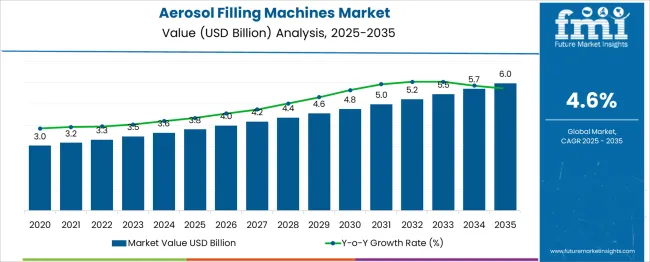
| Metric | Value |
|---|---|
| Aerosol Filling Machines Market Estimated Value in (2025 E) | USD 3.8 billion |
| Aerosol Filling Machines Market Forecast Value in (2035 F) | USD 6.0 billion |
| Forecast CAGR (2025 to 2035) | 4.6% |
Manufacturers are focusing on enhancing throughput, minimizing waste, and ensuring precision in dosing, all of which can be achieved through advanced aerosol filling solutions.
With stringent regulatory norms around product safety and environmental impact, companies are increasingly investing in modular machines that offer flexibility for multi-product lines. Demand from emerging economies, where aerosol-based packaging is gaining popularity in household, disinfectant, and cosmetic applications, is further reinforcing the need for reliable and high-capacity filling solutions.
Technological integration such as servo-controlled filling, vision inspection systems, and automatic valve placement is transforming the production landscape. As sustainability becomes a focal point, machines capable of handling eco-friendly propellants and recyclable packaging materials are expected to gain traction, positioning the market for long-term growth through digital integration, operational flexibility, and compliance with global packaging standards.
The aerosol filling machines market is segmented by type, capacity, valve, operating mode, category, application, distribution channel, and geographic regions. The aerosol filling machines market is divided into Conventional, bag-on-valve, and under-cap. In terms of capacity, the aerosol filling machines market is classified into Medium capacity (100-200 cans per minute), Low capacity (below 100 cans per minute), and High capacity (above 200 cans per minute). The valve market for aerosol filling machines is segmented into Crimping valves and Mounting Valves.
The operating mode of the aerosol filling machines market is segmented into Semi-automatic aerosol filling machines, Manual aerosol filling machines, and Automatic aerosol filling machines. The aerosol filling machines market is segmented into Gas Filling and Liquid filling. The aerosol filling machines market is segmented into Air freshener, Spray paint, Cooking spray, Cosmetic spray, Shaving foam spray, Nasal spray, and Others. The distribution channel of the aerosol filling machines market is segmented into Direct and Indirect. Regionally, the aerosol filling machines industry is classified into North America, Latin America, Western Europe, Eastern Europe, Balkan & Baltic Countries, Russia & Belarus, Central Asia, East Asia, South Asia & Pacific, and the Middle East & Africa.
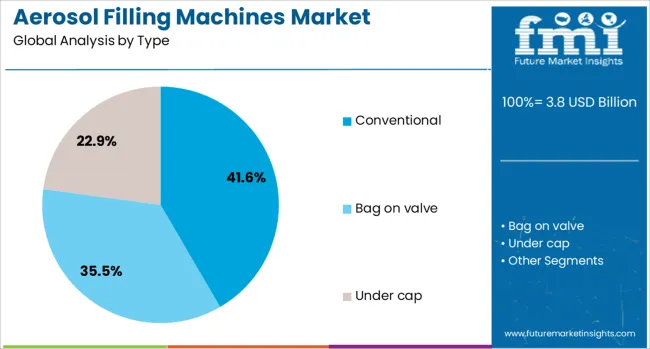
The conventional type segment is projected to account for 41.6% of the aerosol filling machines market revenue share in 2025, highlighting its continued dominance in cost-sensitive and high-volume production environments. The growth of this segment is being driven by its long-standing application in standard aerosol filling lines that require dependable performance with lower capital investment.
Conventional machines are favored in operations where production complexity is minimal, yet throughput requirements remain consistent. Their simple mechanical design and ease of maintenance have positioned them as a preferred choice among manufacturers in developing markets and small to mid-sized enterprises.
The ability of these systems to be easily integrated with semi-automated lines and their compatibility with a wide range of product formulations have further supported their relevance. Operational efficiency, durability, and ease of operator training are key factors that have sustained the market position of conventional machines, particularly in situations where automation needs are moderate and budget constraints influence procurement decisions.
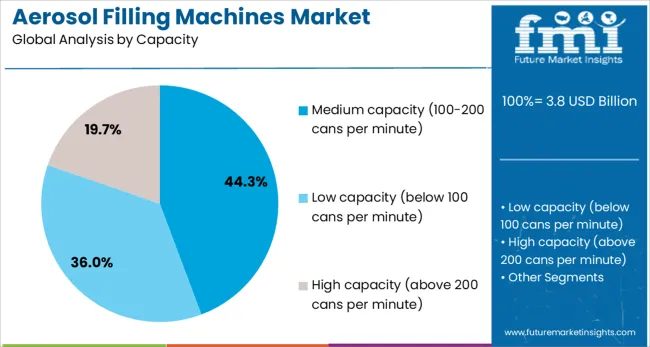
The medium capacity segment, defined by output rates between 100 to 200 cans per minute, is expected to hold 44.3% of the revenue share in the aerosol filling machines market in 2025. The prominence of this segment can be attributed to its balanced performance between high output and cost-efficiency, which aligns well with the operational needs of mid-sized manufacturers.
These systems offer an optimal blend of speed and adaptability, making them suitable for diversified product portfolios without the capital intensity of high-capacity lines. Their design supports efficient changeovers, consistent fill accuracy, and compatibility with standard can sizes, making them ideal for batch production across sectors like personal care, insecticides, and healthcare sprays.
The ability to scale production without overhauling facility infrastructure has contributed to their popularity in contract manufacturing and export-oriented units. As demand for private label and niche aerosol products increases, medium capacity machines are being recognized as a strategic investment for companies seeking operational flexibility with scalable output.
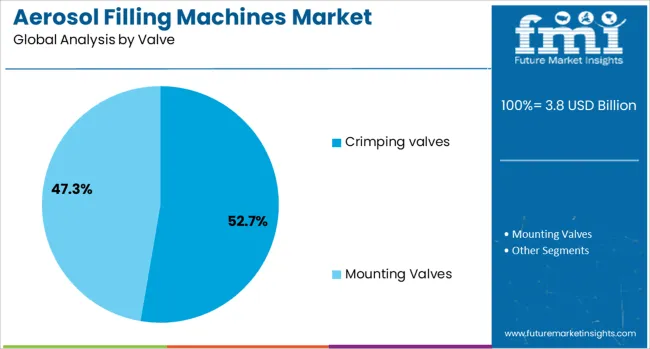
The crimping valves segment is estimated to account for 52.7% of the total revenue share in the aerosol filling machines market by 2025, positioning it as the leading valve segment. The dominance of this segment is being influenced by its critical role in ensuring leak-proof sealing and maintaining product integrity across pressurized containers. Crimping valve systems are widely adopted due to their ability to support high-speed production while maintaining precision in valve placement and crimping force.
Their usage is especially critical in sectors where product safety, dosage control, and pressure consistency are regulatory requirements, such as pharmaceuticals and food-grade aerosols. The compatibility of crimping systems with a wide range of valve types and propellant formulations has enabled their deployment across varied product categories.
Technological enhancements in automated valve alignment and force monitoring have further elevated the reliability of crimping systems, reducing downtime and quality rejections. As demand grows for tamper-proof and contamination-resistant packaging, crimping valves are expected to remain integral to advanced aerosol filling operations.
Aerosol filling machines are critical for the production of sprays, deodorants, paints, and other products, offering precision, efficiency, and high-speed processing. Technological advancements in machine automation, along with the increasing demand for eco-friendly packaging, are driving market growth. Despite challenges such as high initial investments and regulatory compliance, opportunities exist in expanding production capabilities, particularly in emerging markets with growing demand for packaged consumer goods.
The growing demand for aerosol based products is a primary driver for the aerosol filling machines market. Aerosols are widely used across a variety of industries, including personal care, cleaning, automotive, and pharmaceuticals. Products like deodorants, sprays, paints, and air fresheners are essential in daily life, and the need for efficient, high-speed filling systems to meet this demand is rising. The convenience, portability, and ease of use of aerosol products further fuel their popularity. The pharmaceutical sector’s need for precision in filling dosage forms, such as inhalers and sprays, is increasing, leading to a higher demand for advanced aerosol filling machinery. These factors contribute significantly to market expansion.
The primary challenges in the aerosol filling machines market are the high capital investment required for advanced machinery and the complexity of regulatory compliance. Aerosol filling machines are expensive to purchase and install, particularly those with automation and advanced features, which can deter smaller manufacturers from investing in them. The stringent regulations surrounding the manufacturing of aerosol products, especially concerning safety standards and environmental concerns, require constant adaptation and compliance. Regulations regarding the use of propellants, packaging materials, and emissions can add to the complexity and cost of operating these machines, slowing down market adoption in some regions.
The aerosol filling machines market offers significant opportunities through technological advancements and expansion in emerging markets. Technological innovations, such as the development of automated, high-efficiency filling systems, are improving production speeds, reducing operational costs, and enhancing precision in filling processes. These advancements are opening up new opportunities for manufacturers to improve productivity and expand product offerings. Additionally, the growing consumer goods and packaging industries in emerging markets, such as Asia-Pacific and Latin America, present a large untapped market for aerosol products and filling machines. The rising demand for packaged personal care, home care, and automotive products in these regions presents considerable growth opportunities for manufacturers of aerosol filling machines.
A key trend in the aerosol filling machines market is the increasing demand for eco-friendly packaging solutions. As environmental concerns grow, consumers and manufacturers alike are moving towards sustainable aerosol products and packaging, such as using recyclable or biodegradable materials for cans. This has prompted manufacturers to develop filling machines that are compatible with these new packaging materials. Automationng processes is becoming more prevalent, allowing for faster, more precise, and cost-efficient production. Automated systems can handle larger volumes of product and require less manual labor, improving overall productivity. The rise in consumer demand for convenient, eco-conscious products is shaping these trends in the market, further driving innovation in the industry.
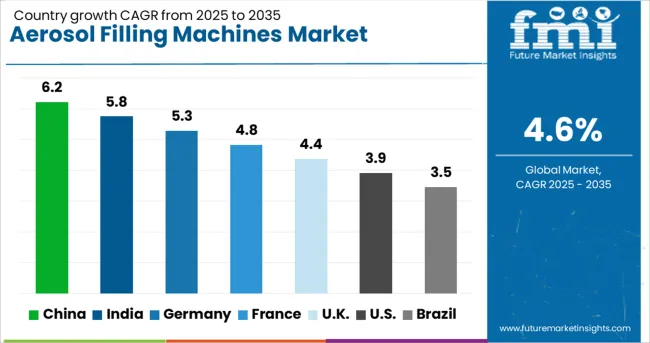
| Country | CAGR |
|---|---|
| China | 6.2% |
| India | 5.8% |
| Germany | 5.3% |
| France | 4.8% |
| UK | 4.4% |
| USA | 3.9% |
| Brazil | 3.5% |
The aerosol filling machines market is projected to grow at a global CAGR of 4.6% from 2025 to 2035. China leads the market with 6.2%, followed by India at 5.8%, and France at 4.8%. The United Kingdom is expected to grow at 4.4%, while the United States is projected to grow at 3.9%. The market growth in China and India is driven by rapid industrialization, increased demand for aerosol-based products, and advancements in manufacturing processes. In OECD nations like France, the UK, and the USA, steady growth is supported by increasing automation, product innovation, and the demand for high-efficiency filling technologies. The analysis spans 40+ countries, with the leading markets shown below.
China is projected to grow at a CAGR of 6.2% through 2035, driven by its robust industrial sector and increasing demand for aerosol-based products. China’s manufacturing base is expanding rapidly, contributing significantly to the demand for efficient and high-quality filling technologies. The demand for aerosol products in sectors such as personal care, automotive, and household chemicals is propelling market growth. China’s focus on reducing production costs and improving manufacturing efficiency supports the increasing adoption of advanced aerosol filling machines in the country.
India is projected to grow at a CAGR of 5.8% through 2035, driven by the expanding consumer goods, healthcare, and personal care sectors. With the rise in disposable income, increasing consumer demand for aerosol-based products such as sprays and perfumes is fuelling market growth. Additionally, India’s expanding manufacturing base and government initiatives supporting industrial growth are contributing to the demand for efficient aerosol filling technologies. The growth in product innovation, including eco-friendly aerosols, and advancements in automation in manufacturing processes will further enhance the demand for aerosol filling machines in the country.
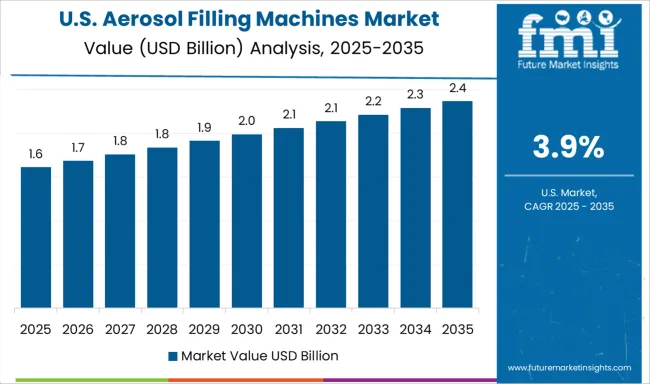
The United States is projected to grow at a CAGR of 3.9% through 2035, driven by increasing automation in manufacturing processes and the rising demand for high-quality aerosol-based products. The USA is adopting advanced filling technologies that improve efficiency and reduce waste in production. The demand for aerosol products in sectors such as personal care, food, and automotive is also driving growth in the market. The regulatory compliance and safety concerns around aerosol products further promote the use of high-performance filling machines.
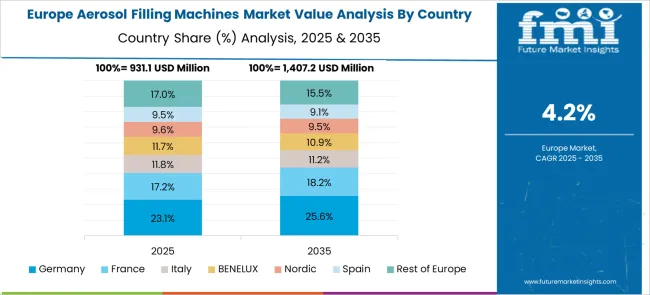
Germany is projected to grow at a CAGR of 4.8% through 2035, with demand driven by industrial advancements and product innovation in the aerosol sector. The country’s robust manufacturing sector, along with its strong focus on automation, is contributing to the market's growth. Germany’s leadership in chemical, automotive, and personal care industries has led to an increasing demand for aerosol products. As manufacturers focus on reducing production costs and increasing operational efficiency, the demand for high-performance aerosol filling machines is set to rise.
The United Kingdom is projected to grow at a CAGR of 4.4% through 2035, with market demand driven by advancements in aerosol packaging and an increasing focus on product safety and efficiency. The UK’s growing consumer goods and personal care sectors, which use aerosol products, significantly contribute to market demand. As manufacturers seek to improve operational efficiency, there is a growing demand for automated and high-efficiency aerosol filling machines. The push for eco-friendly aerosol products and advanced production systems further supports market growth.
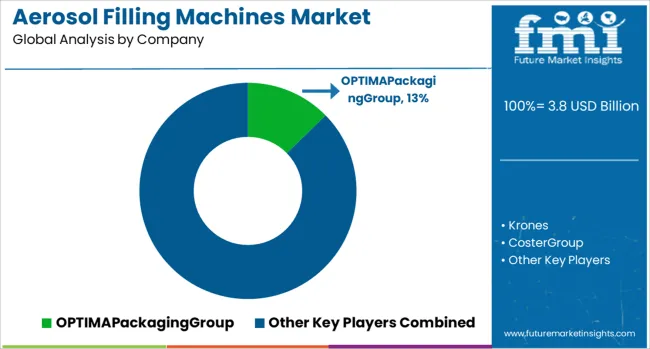
Differentiation is driven by machine throughput, volumetric and gravimetric dosing precision, energy efficiency, and compliance with NFPA, OSHA, and EU ATEX standards for flammable propellants. Service networks, predictive maintenance software, and turnkey line integration further delineate market leadership. High-end players focus on fully automated, sterile, and cleanroom-compatible units, whereas emerging players emphasize flexibility, modularity, and cost efficiency for small and medium-sized aerosol manufacturers. Strategic acquisitions, such as GEA’s integration of specialized valve technology, have strengthened their market foothold, while OEM partnerships enable mid-tier companies to penetrate niche verticals, including organic aerosols and medical inhalants.
GEA Group has been recognized for its continuous-motion aerosol filling lines, which enable higher production speeds for food-grade and pharmaceutical aerosols while maintaining validated hygiene standards. Its modular line architecture allows integration with downstream capping and labeling systems, reducing changeover times. KHS GmbH focuses on fully automated systems for cosmetic and household aerosols, leveraging patented dosing valves and nitrogen-based propellant management to reduce residual pressure variability. These features have enabled KHS to secure contracts with multinational personal care brands in Europe and the Middle East. IMA Group specializes in pharmaceutical-grade aerosol filling, emphasizing sterile filling systems, high-precision volumetric dosing, and integration with cleanroom environments certified under ISO 14644 standards.
Mid-tier players, such as Pamasol and Fomac, differentiate themselves through customizable filling solutions for emerging cosmetic and industrial aerosol applications. Pamasol has pioneered high-speed rotary valves for micro-dosing perfumes and essential oils, enabling smaller batch runs without compromising fill accuracy. Fomac targets emerging markets in Southeast Asia and Latin America, emphasizing semi-automatic and portable aerosol filling units suitable for SMEs producing household cleaning agents and lubricants. Regional entrants, including SaintyCo and CFT Packaging, have established footholds in India and China by offering cost-optimized modular systems with service contracts that minimize equipment downtime in high-volume industrial environments.
| Item | Value |
|---|---|
| Quantitative Units | USD 3.8 Billion |
| Type | Conventional, Bag on valve, and Under cap |
| Capacity | Medium capacity (100-200 cans per minute), Low capacity (below 100 cans per minute), and High capacity (above 200 cans per minute) |
| Valve | Crimping valves and Mounting Valves |
| Operating Mode | Semi-automatic aerosol filling machines, Manual aerosol filling machines, and Automatic aerosol filling machines |
| Category | Gas Filling and Liquid filling |
| Application | Air freshener, Spray paint, Cooking spray, Cosmetic spray, Shaving foam spray, Nasal spray, and Others |
| Distribution Channel | Direct and Indirect |
| Regions Covered | North America, Europe, Asia-Pacific, Latin America, Middle East & Africa |
| Country Covered | United States, Canada, Germany, France, United Kingdom, China, Japan, India, Brazil, South Africa |
| Key Companies Profiled | OPTIMAPackagingGroup, Krones, CosterGroup, PneumaticScaleAngelus, DeckertMaschinenbau, AdolfIlligMaschinenbau, Metalnova, COSMAR, RobinoGalandrino, Jrpacking, MikrofillSystems, EckertZiegler, FranzZiel, Erco, and MarubishiIndustry |
| Additional Attributes | Dollar sales by machine type (semi-automatic, fully automatic) and end-use segments (personal care, pharmaceuticals, automotive, household). Demand dynamics are driven by increasing demand for aerosol products in personal care and industrial sectors, coupled with the growing trend of automation in packaging. Regional trends show strong growth in North America, Europe, and Asia-Pacific, with significant investments in production facilities in emerging markets. |
The global aerosol filling machines market is estimated to be valued at USD 3.8 billion in 2025.
The market size for the aerosol filling machines market is projected to reach USD 6.0 billion by 2035.
The aerosol filling machines market is expected to grow at a 4.6% CAGR between 2025 and 2035.
The key product types in aerosol filling machines market are conventional, bag on valve and under cap.
In terms of capacity, medium capacity (100-200 cans per minute) segment to command 44.3% share in the aerosol filling machines market in 2025.






Our Research Products

The "Full Research Suite" delivers actionable market intel, deep dives on markets or technologies, so clients act faster, cut risk, and unlock growth.

The Leaderboard benchmarks and ranks top vendors, classifying them as Established Leaders, Leading Challengers, or Disruptors & Challengers.

Locates where complements amplify value and substitutes erode it, forecasting net impact by horizon

We deliver granular, decision-grade intel: market sizing, 5-year forecasts, pricing, adoption, usage, revenue, and operational KPIs—plus competitor tracking, regulation, and value chains—across 60 countries broadly.

Spot the shifts before they hit your P&L. We track inflection points, adoption curves, pricing moves, and ecosystem plays to show where demand is heading, why it is changing, and what to do next across high-growth markets and disruptive tech

Real-time reads of user behavior. We track shifting priorities, perceptions of today’s and next-gen services, and provider experience, then pace how fast tech moves from trial to adoption, blending buyer, consumer, and channel inputs with social signals (#WhySwitch, #UX).

Partner with our analyst team to build a custom report designed around your business priorities. From analysing market trends to assessing competitors or crafting bespoke datasets, we tailor insights to your needs.
Supplier Intelligence
Discovery & Profiling
Capacity & Footprint
Performance & Risk
Compliance & Governance
Commercial Readiness
Who Supplies Whom
Scorecards & Shortlists
Playbooks & Docs
Category Intelligence
Definition & Scope
Demand & Use Cases
Cost Drivers
Market Structure
Supply Chain Map
Trade & Policy
Operating Norms
Deliverables
Buyer Intelligence
Account Basics
Spend & Scope
Procurement Model
Vendor Requirements
Terms & Policies
Entry Strategy
Pain Points & Triggers
Outputs
Pricing Analysis
Benchmarks
Trends
Should-Cost
Indexation
Landed Cost
Commercial Terms
Deliverables
Brand Analysis
Positioning & Value Prop
Share & Presence
Customer Evidence
Go-to-Market
Digital & Reputation
Compliance & Trust
KPIs & Gaps
Outputs
Full Research Suite comprises of:
Market outlook & trends analysis
Interviews & case studies
Strategic recommendations
Vendor profiles & capabilities analysis
5-year forecasts
8 regions and 60+ country-level data splits
Market segment data splits
12 months of continuous data updates
DELIVERED AS:
PDF EXCEL ONLINE
Cup Filling Machines Market Forecast and Outlook 2025 to 2035
Bottle Filling Machines Market Size and Share Forecast Outlook 2025 to 2035
Capsule Filling Machines Market Size and Share Forecast Outlook 2025 to 2035
Market Share Breakdown of Capsule Filling Machine Manufacturers
Cosmetic Filling Machines Market Size and Share Forecast Outlook 2025 to 2035
Multi-Head Filling Machines Market Analysis & Demand 2025 to 2035
Volumetric Filling Machines Market Demand and Insights 2025 to 2035
Vial Filling and Capping Machines Market
Auger Powder Filling Machines Market
Liquid Capsule Filling Machines Market Trends – Growth & Forecast 2025 to 2035
Automatic Powder Filling Machines Market
Automatic Liquid Filling Machines Market
Injectable Liquid Filling Machines Market Size and Share Forecast Outlook 2025 to 2035
Hardgel Liquid Capsule Filling Machines Market
Filling and Dispensing System for Nuclear Medicine Market Size and Share Forecast Outlook 2025 to 2035
Filling and Sealing Machine Market Size and Share Forecast Outlook 2025 to 2035
Aerosol Cap Market Size and Share Forecast Outlook 2025 to 2035
Aerosol Packaging Market Size and Share Forecast Outlook 2025 to 2035
Aerosol Printing And Graphics Market Size and Share Forecast Outlook 2025 to 2035
Aerosol Market Size and Share Forecast Outlook 2025 to 2035

Thank you!
You will receive an email from our Business Development Manager. Please be sure to check your SPAM/JUNK folder too.
Chat With
MaRIA